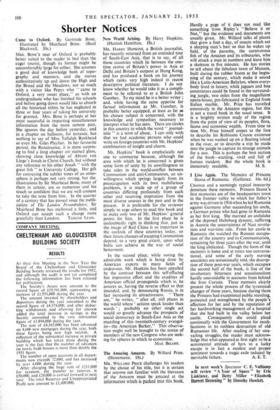New World Arising. By Harry Hopkins. (Hamish Hamilton. 18s.) New
World Arising. By Harry Hopkins. (Hamish Hamilton. 18s.) Mn. HARRY HOPKINS, a British journalist, has recently returned from an extended tour of South-East Asia, that is to say, of all those countries which lie between the one- time centre of Britain's power in Asia at Delhi and Britain's outpost at Hong Kong, and has produced a book on his journey which ranks very high indeed in recent descriptive political literature. I do not know whether he would take it as a compli- ment to be referred to as a British John Gunther. To my mind he is a better writer ; and, while having the same appetite for factual information as Mr. Gunther, is probably better equipped, at least as far as his chosen subject is concerned, with the knowledge and sympathies necessary to interpret what he has seen. There are circles in this country in which the word " journal- istic " is a term of abuse. I can only wish that we had academic persons who could write on foreign countries with Mr. Hopkins' combination of insight and charm.
Mr. Hopkins' book is emphatically not one to summarise because, although the area with which he is concerned is given some form of unity by its unwillingness to take sides in the world-conflict between Communism and anti-Communism, an un- willingness which springs largely from its preoccupation with its bwn multifarious problems, it is made up of a group of countries differing profoundly from each other and receiving inspiration from the most diverse sources in the past and in the present. It is preferable for the reviewer simply to urge others to read this book and to make only two of Mr. Hopkins' general points for him. In the first place he is undoubtedly right in thinking that, just as the image of Red China is so important in the outlook of these countries today, so their future chances of escaping Communism depend, to a very great extent, upon what India can achieve in the way of social betterment.
In the second place, while noting the admirable work which is being done by American experts in many fields of endeavour, Mr. Hopkins has been appalled by the contrast between this self-effacing but impressive effort and the crudities of American official propaganda which is, he assures us, having the reverse effect to that intended, and, by denouncing Russia, is in fact increasing its attractiveness. " There are," he writes, " after all, still places in the world where' actions speak louder than words ' ; probably no other single act would so greatly advance the prospects of social democracy in South-East Asia as the muzzling of this twentieth-century evangel- ist—the American Barker." This-observa- tion might well be brought to the notice of members of the new Congress who are seek- ing for spheres in which to economise.
MAX BELOFF.


































 Previous page
Previous page